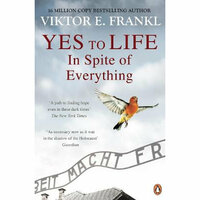You need to sign in or sign up before continuing.
Take a photo of a barcode or cover
In three lecture/chapters and three background chapters, this book delivers and backgrounds views of the author. Life has meaning at an individual and situational level, and it is never valid for anyone to declare that another life has no value, that some lives do not matter.
emotional
hopeful
inspiring
reflective
challenging
hopeful
reflective
fast-paced
I didn't find this book as engaging as A Man's Search for Meaning. It's well written but I found his arguments fallible.
Overall a decent read, but not as inspiring A Man's Search for Meaning
Overall a decent read, but not as inspiring A Man's Search for Meaning
challenging
dark
emotional
hopeful
informative
inspiring
reflective
tense
medium-paced
hopeful
reflective
medium-paced
I cannot rate this book. It is enormously valuable, important, relevant, and hopeful. It is urgent. It has overlaps from “Man’s Search for Meaning” — and the lessons bear repeating.
"...Frankl saw that a materialistic view, in which people end up mindlessly consuming and fixating on what they can buy next, epitomizes a meaningless life..." (p. 14).
"Pleasure in itself cannot give our existence meaning; thus the lack of pleasure cannot take away meaning from life," (p. 31)
"I slept and dreamt
that life was joy,
I awoke and saw
that life was duty.
I worked -- and behold,
duty was joy." (--Rabindranth Tagore)
"A black man who had been sentence to life imprisonment was deported to Devil's Island. When the ship, the Leviathan, was on the high seas, a fire broke out. Due to the calamitous situation, the prisoner was released from his shackles and took part in the rescue work, He saved ten lives. As a result, he was later pardoned....if one had asked this man before embarking...whether continuing to live could have had any kind of meaning for him, he would have had to shake his head....But none of us knows what is waiting for us, what big moment, what unique opportunity for acting in an exceptional way..." (p. 34).
"We give life meaning not only through our actions but also through loving and finally through suffering. Because how can human beings deal with the limitations of their possibilities regarding how it affects their actions and their ability to love, how they behave under these restrictions -- the way in which they accept their suffering ... in all of this they still remain capable of fulfilling human values," (p. 39).
"...human beings are able to give meaning to their existence, firstly, by doing something, by acting, by creating -- by bringing a work into being; secondly, by experiencing something -- nature, art -- or loving people; and thirdly, human beings are able to find meaning even where finding value in life is not possible for them in either the first or the second way - ...when they take a stance toward the unalterable, fated, inevitable, and unavoidable limitation of their possibilities; how they adapt to this limitation, react toward it, how they accept this fate," (p. 59).
"If you had looked more closely at that man in that group, you would have noticed that he had sewn onto his coat and his trousers small scraps of linen on which a number was visible: 119104. And if you had looked through the Dachau camp records, you would have found that beside this number was written the name of the camp inmate: Frankl Viktor" (p. 86).
"...Frankl saw that a materialistic view, in which people end up mindlessly consuming and fixating on what they can buy next, epitomizes a meaningless life..." (p. 14).
"Pleasure in itself cannot give our existence meaning; thus the lack of pleasure cannot take away meaning from life," (p. 31)
"I slept and dreamt
that life was joy,
I awoke and saw
that life was duty.
I worked -- and behold,
duty was joy." (--Rabindranth Tagore)
"A black man who had been sentence to life imprisonment was deported to Devil's Island. When the ship, the Leviathan, was on the high seas, a fire broke out. Due to the calamitous situation, the prisoner was released from his shackles and took part in the rescue work, He saved ten lives. As a result, he was later pardoned....if one had asked this man before embarking...whether continuing to live could have had any kind of meaning for him, he would have had to shake his head....But none of us knows what is waiting for us, what big moment, what unique opportunity for acting in an exceptional way..." (p. 34).
"We give life meaning not only through our actions but also through loving and finally through suffering. Because how can human beings deal with the limitations of their possibilities regarding how it affects their actions and their ability to love, how they behave under these restrictions -- the way in which they accept their suffering ... in all of this they still remain capable of fulfilling human values," (p. 39).
"...human beings are able to give meaning to their existence, firstly, by doing something, by acting, by creating -- by bringing a work into being; secondly, by experiencing something -- nature, art -- or loving people; and thirdly, human beings are able to find meaning even where finding value in life is not possible for them in either the first or the second way - ...when they take a stance toward the unalterable, fated, inevitable, and unavoidable limitation of their possibilities; how they adapt to this limitation, react toward it, how they accept this fate," (p. 59).
"If you had looked more closely at that man in that group, you would have noticed that he had sewn onto his coat and his trousers small scraps of linen on which a number was visible: 119104. And if you had looked through the Dachau camp records, you would have found that beside this number was written the name of the camp inmate: Frankl Viktor" (p. 86).
challenging
informative
reflective
medium-paced
Der erste Teil des Buches ist wirklich fantastisch und ist eine außergewöhnliche Beschreibung von Viktor Frankls Erlebnissen im KZ. Besonders seine Schlüsse am Ende seiner Schilderungen lassen sich leicht mit ins eigene Leben nehmen. Der zweite Teil, das Theaterstück, ist durchwegs spannend zu lesen, hat mich aber zugegeben nicht vom Hocker gehauen.





